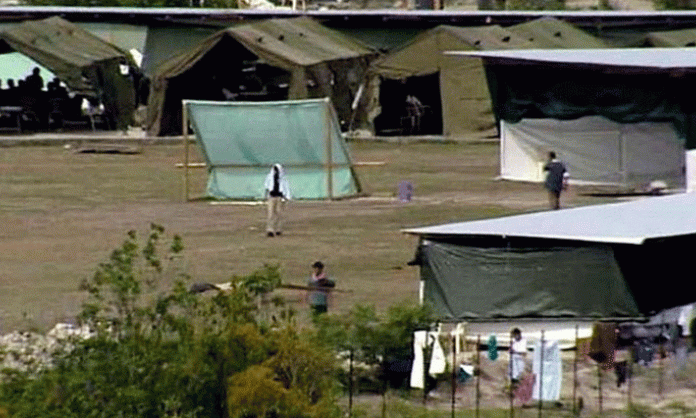Concentration camp – noun 1. a place in which large numbers of people, especially political prisoners or members of persecuted minorities, are deliberately imprisoned in a relatively small area with inadequate facilities.
Immigration minister Scott Morrison has attempted to erect a wall of silence around the government’s treatment of refugees. But the awful truth is the government’s worst kept secret: the Manus Island and Nauru concentration camps are hellholes.
As of 15 November, 1,786 people are imprisoned on the two islands. Workers at the facilities have shed new light on the conditions these detainees endure.
One Nauru case worker, speaking anonymously in November to Fairfax journalist Julie-Anne Davies, described the camp:
“[T]here’s not enough space for the kids to run around in; we can’t take them to the park, the beach, nowhere … Families of five live in one little area of a large marquee divided only by clear tarpaulins so there is no privacy. Husbands and wives can’t have sex, can’t do anything without everyone knowing their business.”
In the men’s camp, she related, “There are three or four toilets for [350] men and they just couldn't manage. They were soiling themselves and then having to wait in line for hours to have a two minute shower. It was really, really shocking.”
Another worker from the male-only Manus Island camp said, “As time goes by the men are getting more desperate and more sick. They all complain about kidney pain, headache, insomnia, but it takes at least three weeks for a doctor to see a client.”
The abuses of human dignity are so bad in Australia’s offshore concentration camps that one senior executive of a charity contracted to provide services confided, “I wake up in the middle of the night in a cold sweat, worried that one day we may have to face a royal commission and have to answer for the conditions under which these people were treated and which we didn’t have the guts to challenge the government on.”
Amid repeated reports and warnings about the health of detainees, Morrison has shown nothing but disregard: “It doesn’t matter whether you’re a child, it doesn’t matter whether you’re pregnant, it doesn’t matter whether you’re a woman, it doesn’t matter if you’re an unaccompanied minor, it doesn’t matter if you’ve got a health condition”, he said on 15 November during his weekly “Sovereign Borders” media briefing.
“If you are fit enough to get on a boat, then you can expect you’re fit enough to end up in offshore processing.”
The testimony of those who know the truth, and the responses of the man charged with defending gross human rights violations, are the just the latest indictments of Australia’s detention regime.
In mid-November pregnant detainee Latifa, a 31-year-old Rohingya woman, was flown to Brisbane from Nauru to give birth. She was separated from her baby Farus and placed in a Brisbane detention centre four days later, with her visitation rights limited to six hours per day.
Reflecting from Colombo, Sri Lanka, on how and why a new mother could be treated in such a way, Abbott said: “[B]ecause people have come to Australia illegally by boat … I don't, as it were, apologise for what happens when people come to Australia illegally by boat.”
The prime minister’s comment came as the Global Mail reported that a “profoundly disabled” four-year-old Tamil girl is to be deported, along with her father, to Nauru. The report, if true, is beyond words. She may yet be considered lucky by some, however.
In an unprecedented and shocking development, the Liberals on 17 November signed an agreement with the Sri Lankan government to provide it with two patrol boats to intercept asylum seekers fleeing the country.
The Australian government is in effect providing aid to the Rajapaksa regime to continue its genocide against the Tamil population and to prevent people fleeing the terror.
The record of this government, scarcely two months old, is already beyond criminal.








